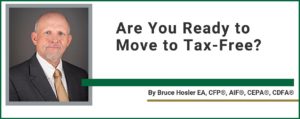Breaking Down the Benefits of Qualified Charitable Distributions
Charitable giving is a popular tax-saving tactic we explore when evaluating ways to limit our clients’ tax liabilities in retirement.
One of our favorite tax-saving tools related to charitable giving is the qualified charitable distribution.
What is a Qualified Charitable Distribution?
A qualified charitable distribution (QCD) is an IRA distribution that’s made to a qualified charity or nonprofit organization on behalf of an IRA owner.
The IRS allows an annual QCD limit of $100,000 per taxpayer. That means a married couple can give up to $200,000 via a QCD.
QCDs can be made from traditional IRAs and inherited IRAs. Other retirement accounts like a 401k, or 403b, cannot be used for a QCD. Those retirement accounts can be rolled over into an IRA so that a QCD can be made from the IRA.
QCDs can be used to fulfill your IRA’s required minimum distribution (RMD) and come with several tax benefits.
Tax Benefits of a QCD
Unlike normal charitable donations, which provide a tax deduction to the taxpayer, giving via a QCD allows the taxpayer to exclude the full amount of the donation from their income on their 1040.
This means you don’t have to include the amount of the QCD in your gross adjusted income, which helps avoid triggering certain thresholds that would push you into a higher tax bracket.
Not only would a higher tax bracket cost you more in taxes, it could be the difference between making your Social Security benefits taxable or subjecting Medicare premiums to surcharges because your income is too high.
Who Can Make a QCD?
There are a few limitations on who can make QCDs.
First, whether you’re the IRA owner or you’ve inherited an IRA, you must be at least 70 and a half years of age to make a QCD.
That means you can make a QCD before you must start taking required minimum distributions (RMDs), which kick in at age 73 now with the new Secure ACT 2.0.
Failing to Plan for Estate Taxes
Many people may not think they’ll owe estate taxes because of today’s exemption amount of roughly $12.9 million per person.
But given that Estate Tax exemption amounts are set to expire in 2025, the current limits are scheduled to sunset, lowering the lifetime exemption amount down to around an inflation-adjusted amount of $6 to $7 million per person.
If your estate is valued at $3 to $4 million today, in a decade, that could easily double, meaning you’d likely have a taxable estate. With current estate tax rates set at 40% for most taxable estates, there can be a lot of tax dollars on the line.
There are tools and strategies you need to explore to protect your family against paying unnecessary estate taxes. Everyone’s situation is unique, and it’s important to consult with a team of estate planning professionals (Financial Planners, Tax professionals, and Estate Planning Attorneys) to explore which solutions will work best for you.
Mistakes to Avoid with a QCD
A qualified charitable distribution is a powerful and beneficial tax-saving tool. But there are a few potential hazards you want to look out for and avoid.
For one, QCDs are calendar year transactions. This means if you wish to make a QCD for your 2024 taxes, it must be processed during the 2023 calendar tax year, sometime between January and December.
Secondly, when making a QCD, it’s absolutely critical that the check be made payable to the charitable organization itself rather than the IRA owner. Otherwise, the distribution will be recorded as going to the individual IRA owner and count as a normal IRA distribution.
This is also important to keep in mind if you have check-writing abilities on your IRA. Your IRA custodian won’t record the distribution to the charity until the organization cashes the check. But what happens if they hold onto the check, lose it, or don’t cash it until after the end of the year?
Simply put: Always make sure the distribution check is cut by the IRA custodian and is made payable to the charitable organization.
One final mistake to avoid: It’s up to you, the taxpayer, to let your tax professional know about your QCD donation.
There is no special designation or marking on your annual 1099-R tax form from your IRA custodian that will indicate a distribution was a charitable one. It’s the responsibility of the IRA owner to relay this information to their tax professional.
Otherwise, your accountant won’t know to indicate on your tax return that you made a QCD and you will likely be taxed at ordinary income rates on the distribution.
Ready to Explore Your QCD Options?
At Hosler Wealth Management, we’re big fans of qualified charitable distributions. They allow taxpayers the ability to take full advantage of tax-deferred growth inside their IRA and receive another huge tax break when making a charitable donation. Talk about a win-win!
Request a call or send us a message to see how our financial experts in Scottsdale and Prescott can help you map out your QCD strategy and achieve your financial goals in retirement.
This material is intended for informational/educational purposes only and should not be construed as specific tax, legal or investment advice. Individual circumstances may vary.
Disclosure: Securities and advisory services offered through Commonwealth Financial Network®, Member www.FINRA.org/www.SIPC.org, a Registered Investment Adviser. 700 S. Montezuma Street, Prescott, AZ 86303. Phone: 928.778.7666. The Financial Advisors associated with this website may discuss and/or transact business only with residents in states in which they are properly registered or licensed. No offers may be made or accepted from any resident of any other state. Please check Broker Check for a list of current registrations. Information presented on this site is for informational purposes only and does not intend to make an offer or solicitation for the sale or purchase of any product or security. Fixed insurance products and services are separate from and not offered through Commonwealth. Tax preparation and accounting services offered by Hosler Wealth Management, LLC are separate and unrelated to Commonwealth. Commonwealth Financial Network® does not provide legal or tax advice. You should consult a legal or tax professional regarding your individual situation.
© 2023 Hosler Wealth Management LLC




Leave A Comment